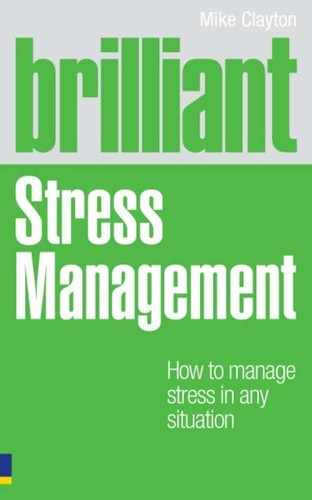
Control your mental response to stress 125
Self-talk
Most of us say things to ourselves that we would never dare say
to the people around us; things that would offend, demean and
belittle. Are these the sorts of things you say to yourself when you
feel under stress and things are not going your way? If so, this is
strange, as it is the one conversation you have total control over.
This is important because a well-chosen word can give you a
massive boost. Consider the difference between: ‘I’m rubbish’
and ‘That did not go well . . . this time.’
A 24-hour motivation coach . . . for free
Now, if you could say motivating, empowering things, what
would you say to yourself now? And you can say these things to
brilliant
activity
Gratitude journal
Get yourself a fresh notebook and pen – nice ones are ideal – and on the
first page write the date and the words ‘Gratitude Journal’.
Each night, before bed (or maybe in bed before you turn out the light), write the
date and write down what you feel grateful for there and then. It will often be
for something that happened during the day. It can also be something bigger in
your life that you are grateful for. You may write about one thing or several. You
may write at length or briefly. You may write prose or just notes – you may even
write verse. It does not matter what you write, as long as you write something.
Keep this up for at least a month, but feel free to keep going longer. Many
people find it so valuable that it becomes a habit, and their gratitude journal
becomes their form of daily journal. What you will notice is how different
you start to feel about your life, as your troubles are set back into perspective
among the many, once forgotten, things that you have to be grateful for.

126 brilliant stress management
yourself, can’t you? Of course you can. Also think about how
you say things. Consider the difference between: ‘I got really
lucky,’ which credits your success to luck, and ‘I really grabbed
that opportunity and made a huge success of it,’ which gives you
the credit. Words are important. Start to notice the words you
choose and make the choices that give you a real boost. They
offer attery, motivation, condence building and a mental
boost – all for free!
Make yourself your own motiva-
tional coach. Don’t worry about
being over-the-top and cheesy,
because nobody can hear you. It’s
time someone loved and believed in you, and you can have
their voice with you all the time, telling you that setbacks are
temporary, problems are there to resolve, and your successes are
triumphs. Whenever you do something good, or things go well
for you, tell yourself: ‘Well done’ or ‘That was good.’
Victim talk and survivor talk
We saw earlier in this chapter how important it is to take control
of the meaning you attach to events. Events are what they are.
What impacts upon us is the interpretation we put on them. You
can control your sense of the meaning of events and how they
affect you by choosing the questions you ask yourself. No longer
see yourself as a victim: start to see yourself as a survivor. For
example:
A victim will ask: ‘Why is life so unfair?’
A survivor will ask: ‘What is really happening here?’
A victim will ask: ‘Why will nobody listen to me?’
A survivor will ask: ‘What is there that I can do?’
A victim will ask: ‘Why me?’
A survivor will ask: ‘What opportunities are there for me?’
A victim will ask: ‘Whose fault is it?’
make yourself your own
motivational coach
Control your mental response to stress 127
A survivor will ask: ‘What can I learn from this?’
A victim will ask: ‘When is it all going to end?’
A survivor will ask: ‘Where do I want to be in six months?’
The questions you ask dictate the answers you get. If you want
good answers, you have to ask good questions.
Who are you?
One of the things we all do is put all sorts of labels on ourselves.
Few are genuinely neutral with respect to our self-esteem and
mental self-talk, because of the associations we attach to them.
Some, however, can be genuinely destructive, while others can
be life-enhancing. A lot of them arose early in our lives when we
were too naïve to question them.
‘I’m an idiot.’
‘I’m clumsy.’
‘I’m born unlucky.’
‘I’m uneducated.’
‘I’m a failure.’
You must get rid of these labels and any like them. Instead,
replace them with honest labels that describe the best in you;
and use positive adjectives too. If you value your role as a
husband or wife, then ‘I’m a husband’ or ‘I’m a wife.’ But go
further: ‘I’m a husband who does everything he can to be a good one’
or ‘I’m a wife who loves my husband.’ If you value learning but
had little education: ‘I’m someone who will take any opportunity to
learn something new’ or, if you once knocked over the crockery at
a department store, how about: ‘I’m someone who makes an effort
to be aware of what’s around me’?
Be good to yourself
In everything you say to yourself, treat yourself well; treat your-
self like royalty. You would never raise your voice to a queen or
a president, so don’t do it to yourself. Change the tone of the
..................Content has been hidden....................
You can't read the all page of ebook, please click here login for view all page.
